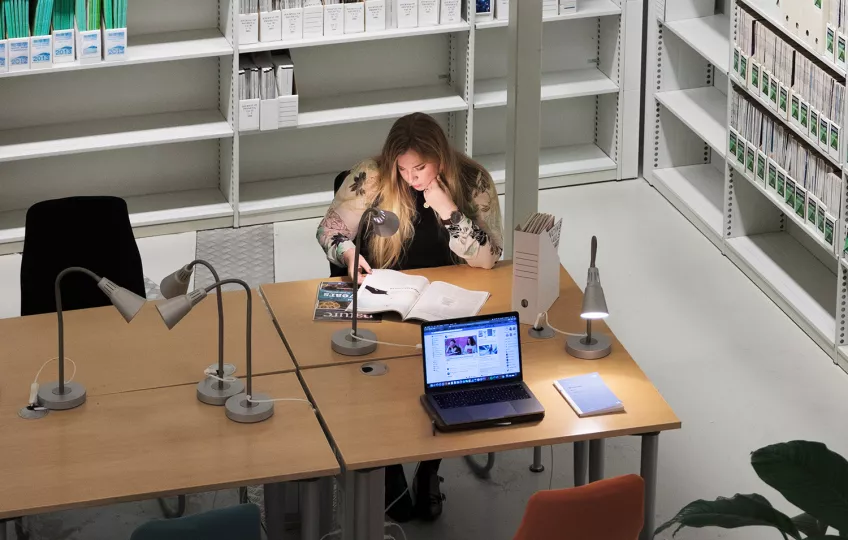Referencing
Academic writing is a central part of your studies. Your own knowledge is based on other people's texts and work. Therefore, it is important that you credit the sources and ideas that you use correctly.
A correct and consistent list of references is essential so your readers can judge your work accurately and evaluate the sources you have used. Different institutions and subject areas use various reference styles, and you can find more information about different styles below. Ask our librarians if you need help.
Shortcuts to the content
Reference management guides
The context in which you will publish your work, or the specific subject area, often determines which reference style you should use. There are many different styles and variations, so to consult templates and examples in a style guide helps you create your references consistently and accurately. These guides outline the necessary information to include in each reference and the order in which the information should be presented.
These are guides for the most common reference styles used at the Faculty of Science. If you are unsure which reference style to use, contact your teacher or supervisor.
ACS
ACS is created by the American Chemical Society, it is a numerical system where the source is indicated by a number in the text.
ACS style, quick guide from ACS Publications
ACS referencing guide from Murdoch University
APA
APA is created by the American Psychological Association, and is a development of the Harvard system. It is a so-called author-year style where the source is indicated with the author's surname and year of publication within parentheses in the text. If you are a student at the Department of Biology, the Department of Geology, the Department of Physical Geography and Ecosystem Science or the Center for Environmental and Climate Science, you should use APA.
Reference guide for APA 7th edition from the Library of Science
APS
APS is created by the American Physical Society. It is a numerical system where the source is indicated by a number in the text.
Physical Review style and notation guide from APS (PDF, 443 kB, opens in a new window)
The examples start on page 7 in the document.
References in Physical Review and Physical Review Letters, quick guide, from APS
Journal titles should be abbreviated when using APS. In the National Library of Medicine's catalogue you can search for the journal (by title or ISSN) and retrieve the correct abbreviation of the title to use in your reference.
How to abbreviate journal titles according to the NLM catalogue
Harvard
The Harvard style is not a uniform system but exists in a variety of variations. It is a so-called author-year style where the source is indicated with the author's surname and year of publication within parentheses in the text.
Harvard guide from University of Sheffield
Vancouver
Is a numerical system where the source is indicated by a number in the text.
Guide to Vancouver from Karolinska institutet University Library
Reference management software
Reference management software can be useful for major writing projects such as a Bachelor's paper, a Master's paper or a PhD thesis, as it can help you manage your references, save full texts, and create lists of references in a variety of styles.
EndNote
Students at Lund University have access to the reference management software EndNote. The Library of Science offers EndNote tutorials for students who are about to write their thesis. Contact Britta Smångs (britta [dot] smangs [at] science [dot] lu [dot] se) for EndNote support and guidance.
Students can also download EndNote and learn the basics from online tutorials.
Endnote 20 Introductory course created by librarians at Lund University – canvas.lu.se
Get started with EndNote via the Social sciences library guide to – lub.lu.se
Zotero
Zotero is a free and open source reference management software. We have created a Zotero workshop for beginners in Canvas that will guide you through how to get started and use the program. You can take the workshop whenever you want.
Zotero workshop for beginners – canvas.lu.se
If you want a manual to Zotero, or want to know more about the program, please go to Zotero's own quick start guide.
Quick start guide for Zotero – zotero.org
You can also contact Frida Rosengren (frida [dot] rosengren [at] science [dot] lu [dot] se) for Zotero support and guidance from the library.
Other reference management software
There is a range of other open source reference management software to choose from, such as Mendeley and JabRef. In physics and engineering, it is common to use open source programs such as BibTeX and LaTeX.
Cheating and plagiarism
Lund University uses the tool "Ouriginal" (formerly Urkund) to detect and prevent cheating and plagiarism. It is an email-based tool that uses text-matching and writing-style analysis to analyse students’ work.
Book a librarian
Students, doctoral students, researchers, lecturers: anyone can book a librarian for help with citations and references, registering dissertations and research publications, managing research data, study support, and more.


